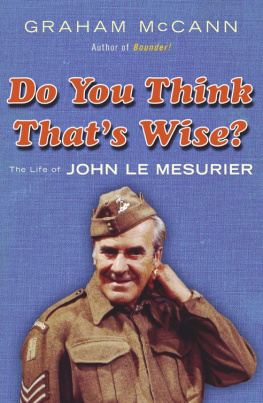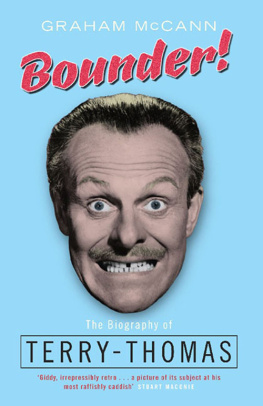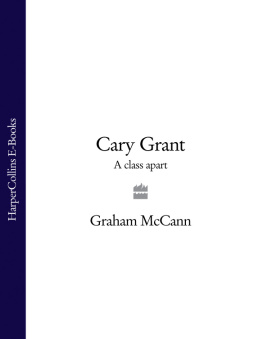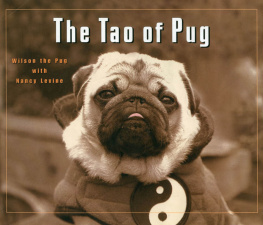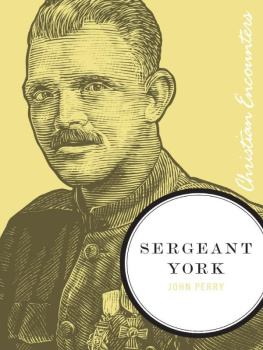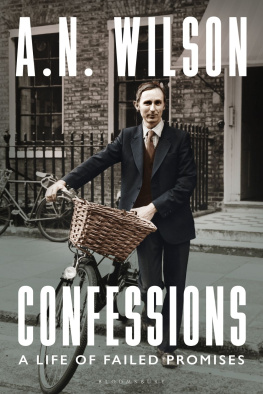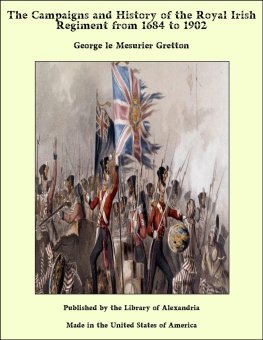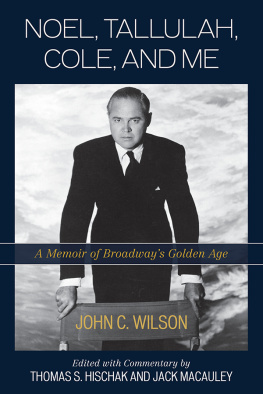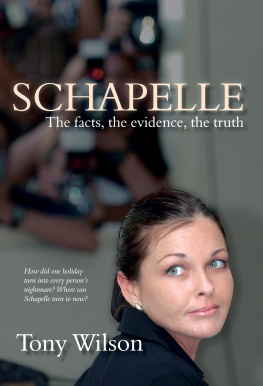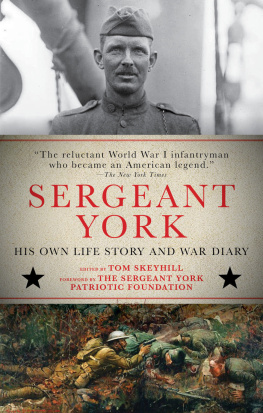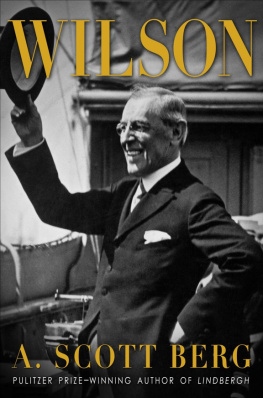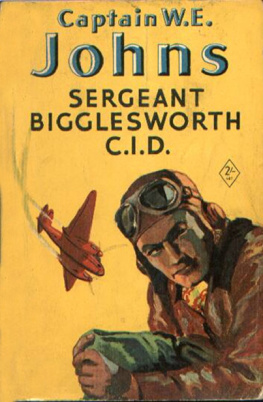Many people have helped in a variety of ways during the writing of this book. First and foremost, I would like to thank Joan Le Mesurier and Robin Le Mesurier for their kind co-operation, encouragement, understanding and support.
I would also like to thank everyone else who agreed to interviews, committed their memories to paper or provided information and memorabilia. I am extremely grateful to all of them, including David Croft, Jimmy Perry, Ian Lavender, Bill Pertwee, Frank Williams, Colin Bean, Sir Paul Fox, Richard Briers, John Howard Davies, John Ammonds, Jonathan Cecil, Vince Powell, Brian Culcheth, Harry Fielder, Barry Took, Sir David Jason, Annette Crosbie and Lord Tollemache.
I must also record my thanks to the staff of the following institutions: the BBC Written Archives Centre (especially Trish Hayes); the National Archives; the London Metropolitan Archives; the British Library, Newspaper Library and Sound Archive; The Stage; the Theatre Museum; the Margaret Herrick Library; the National Film and Sound Archive of Australia; the British Film Institute Library; and the University of Cambridge Library. The excerpt by Alec Waugh from The Loom of Youth ( Alec Waugh, 1917) is reproduced by permission of PFD on behalf of the Estate of Alec Waugh. My original editor at Aurum, Karen Ings, and my agent, Mic Cheetham, initiated the project, and Graham Coster oversaw its conclusion. I am pleased to acknowledge, in addition, the assistance of several other people at Aurum including Lydia Harley, Barbara Phelan and Sarah Whale as well as Steve Gove, Sharon Gregory, Richard McCann, Irene Melling, Christopher Potter and Andrea Thompson.
Finally, my heartfelt thanks go, as always, to my wonderful mother, Vera McCann, Dick Geary and Silvana Dean. Their kindness, company and good humour helped me see the project all the way through to its conclusion.
Oh how the ghost of you clings
These foolish things
Remind me of you.
How awfully nice to seeyou.
On one more drab and damp autumn morning back in 1983, countless British people, browsing through their newspapers over breakfast, came across the following announcement tucked away in the classified pages of The Times:
John Le Mesurier Wishes it to be known that he conked out on November 15th. He sadly misses family and friends.
From such a self-effacing celebrity, the farewell, though unconventional, could hardly have seemed more apt.
The actor known affectionately as Le Mez had never been guilty of taking himself too seriously. From the early days of his career as a seemingly ever-present, uncomfortable-looking authority figure in the British movies of the fifties and early sixties, to his prime time on television as the dreamy and sweetly teasing Sergeant Arthur Wilson in the hugely popular sitcom Dads Army, John Le Mesurier had never been anything other, in his own eyes, than an ordinary jobbing actor moving from one role to another as he simply tried to ply an honest sort of trade. I couldnt care less, he always said, if my name is billed above or below the title. merely thanked everyone politely, strolled back home and started using the award as a humble door stop.
It came as no great surprise, therefore, that he ended up even making light of his own death, eschewing all thoughts of dimmed theatrical lights, solemn eulogies and fragrant floral displays in favour of a comically low-key and prosaic-sounding little message about having conked out. That, however, was one of the reasons why John Le Mesurier was destined to be so keenly and sincerely missed. He would have been horrified by the kind of crass accoutrements that come with todays brand of exaggerated fame: the tittle-tattle tabloid tales, the over-exposed chat show expatiations, the ill-informed political disquisitions and the private lives made all too shamelessly public. All he used to say, even at the height of his own success, was that he felt very lucky to be paid for doing what he loved to do, and that he was flattered by any applause that his efforts elicited.
He might not have realised how good he really was but his audience certainly did, and they admired him even more for his old-fashioned but deeply appealing sense of modesty. He stood for something rather special. He still does.
What words best sum up the publics perception of a man like John Le Mesurier? Charming, yes, undeniably so; urbane and gentlemanly, again, undoubtedly; shy, diffident and dry, almost certainly; and, following on from all of that (and in spite of the foreign-sounding surname), English, profoundly and indubitably. John Le Mesurier seemed, indeed, like the most admirable type of Englishman around: kind and polite; rooted yet worldly; well brought up but most definitely not snobbish; interesting yet self-deprecating; and, lurking discreetly beneath the sang-froid surface, a thoroughly and endearingly playful sort of presence.
He was, on the stage and the screen, a strange hybrid of star and supporting player, in the sense that, more often than not, whatever character he portrayed seemed very much like his own increasingly familiar public persona. His grudgingly dutiful judges, barristers and clerks of the court always looked as though they would much rather be back at their club nursing another large glass of cognac by the fire; his twitchy bureaucrats appeared to be waiting anxiously for someone or something to turn up and free them from the terrible tedium of their long-term jobs; and his absent-minded aristocrats seemed a little envious of any less class-bound, but still subtly sybaritic, kind of modern democratic lifestyle. Few actors, in short, were better at embodying that peculiarly English brand of wistful hedonism that opened the eyes while pursing the lips.
He was a rather different person behind the scenes, in private, where his best friends cherished the chance to share some of his hard-earned leisure hours. He would call them up early on in the spare evenings and, in that wonderfully soft, snug and languorous tone of his, enquire conspiratorially, Play time ? before tempting them with the pleasurable anticipation of late night adventures. He loved to unwind at jazz clubs, race meetings and cocktail bars. He relished fine wine, good food and great company. He adored having harmless, but worthwhile, fun. He never hid from the fact that he worked in order to live rather than lived in order to work.
As a professional performer, however, he was far more artful and effective than he ever cared to suggest. You should always try to play the same character and, when possible, wear the same suit, but, in practice, he was a quiet master of his own particular aspect of the acting craft. True, he did not really do action or accents, nor did he do much emoting or camera-catching animation, but, then again, such qualities were seldom required for the kind of characterisations that he was asked to convey. What John Le Mesurier did do so well, in his own subtle way, was to appear so unobtrusively normal and casually, but memorably, authentic.
People knew in real life of grudgingly dutiful judges, barristers and clerks of the court, and twitchy bureaucrats and absent-minded aristocrats (and dreamy, sweetly teasing, Arthur Wilsons), just like the ones that he portrayed. People understood what he seemed to be thinking and feeling without having to strain to make sense of his presence. Every good British screen comedy, for that reason, needed someone as good, sensitive, intelligent and unselfish as John Le Mesurier in its cast. He supplied the reassuring watermark of realism on every crisp new comic print.

